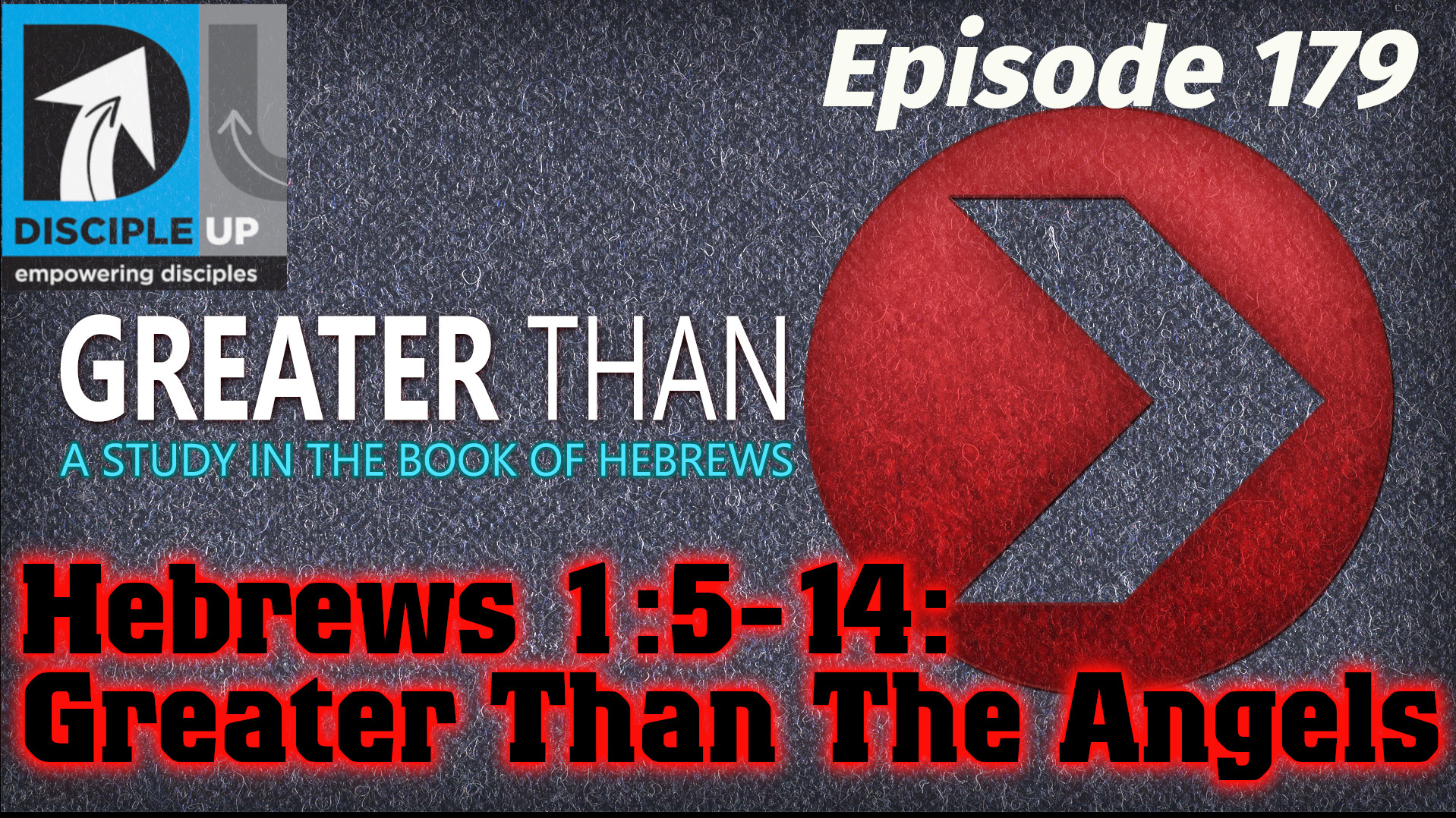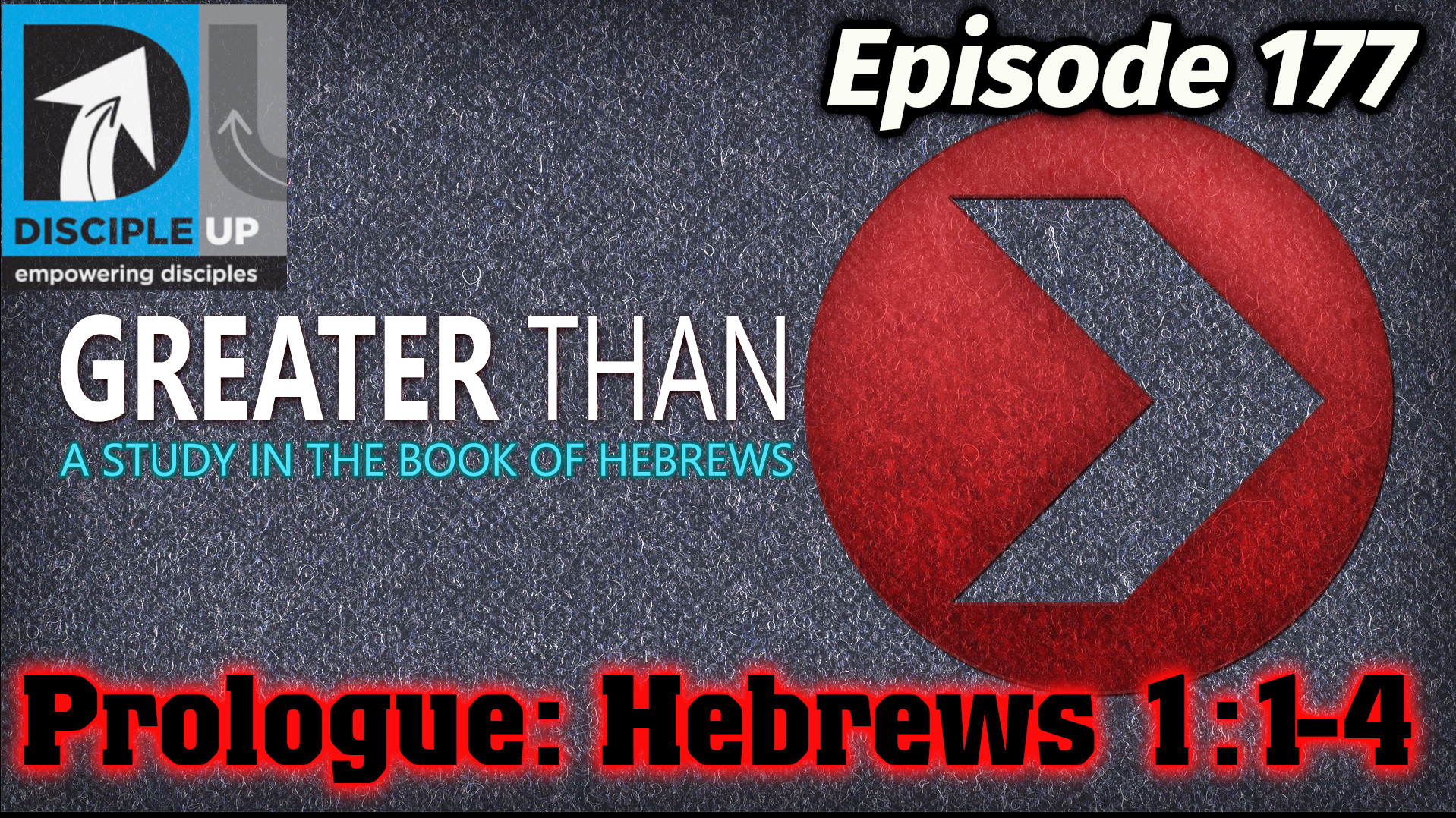Disciple Up # 177
Greater Than – Hebrews Pt. 1 – Prologue
By Louie Marsh, 9-16-2020
Intro.
Prologue
Hebrews 1: 1-4
1 Long ago, at many times and in many ways, God spoke to our fathers by the prophets, 2 but in these last days he has spoken to us by his Son, whom he appointed the heir of all things, through whom also he created the world. 3 He is the radiance of the glory of God and the exact imprint of his nature, and he upholds the universe by the word of his power. After making purification for sins, he sat down at the right hand of the Majesty on high, 4 having become as much superior to angels as the name he has inherited is more excellent than theirs. Hebrews 1:1-4 (ESV)
VERSE ONE:
1 Long ago, – God has been communicating with mankind for a long, long time, nothing new about it.
at many times – He didn’t do it all at once but scattered the prophets and others throughout Israel’s history.
and in many ways,
This refers to the difference of the various revelations in contents and form. Not the different ways in which God imparted his revelations to the prophets, but the different ways in which he spoke by the prophets to the fathers: in one way through Moses, in another through Elijah, in others through Isaiah, Ezekiel, etc. At the founding of the Old Testament kingdom of God, the character of the revelation was elementary. Later it was of a character to appeal to a more matured spiritual sense, a deeper understanding and a higher conception of the law. The revelation differed according to the faithfulness or unfaithfulness of the covenant-people. Vincent – Word Studies in the New Testament.
10 so that through the church the manifold wisdom of God might now be made known to the rulers and authorities in the heavenly places. Ephesians 3:10 (ESV)
A very striking phrase. The adjective occurs only here, and means variegated. It is applied to pictures, flowers, garments. Ποίκιλον is used in the Septuagint of Joseph’s coat, Genesis 37:3. Through the Church God’s wisdom in its infinite variety is to be displayed—the many-tinted wisdom of God—in different modes of power, different characters, methods of training, providences, forms of organization, Vincent – Word Studies in the New Testament.
God spoke to our fathers by the prophets,
“In many ways.” Adverb from old adjective polutropos, in Philo, only here in N.T. The two adverbs together are “a sonorous hendiadys for ‘variously'” (Moffatt) as Chrysostom (diaphorōs). God spoke by dream, by direct voice, by signs, in different ways to different men (Abraham, Jacob, Moses, Elijah, Isaiah, etc.). – Robertson – Word Pictures in the New Testament.
VERSE TWO:
2 but in these last days
Yes, we are living in the Last days and have been for over 2000 years.
16 But this is what was uttered through the prophet Joel: 17 “‘And in the last days it shall be, God declares, that I will pour out my Spirit on all flesh, and your sons and your daughters shall prophesy, and your young men shall see visions, and your old men shall dream dreams; 18 even on my male servants and female servants in those days I will pour out my Spirit, and they shall prophesy. Acts 2:16-18 (ESV)
he has spoken to us by his Son,
Hath spoken (elalēsen). First aorist indicative of laleō, the same verb as above, “did speak” in a final and full revelation – Robertson – Word Pictures in the New Testament.
Note the absence of the article. Attention is directed, not to Christ’s divine personality, but to his filial relation. While the former revelation was given through a definite class, the prophets, the new revelation is given through one who is a son as distinguished from a prophet. He belongs to another category. The revelation was a son-revelation. See 2:10-18. Christ’s high priesthood is the central fact of the epistle, and his sonship is bound up with his priesthood… – Vincent – Word Studies in the New Testament.
whom he appointed the heir of all things,
Hath appointed (ethēken). First aorist (kappa aorist) active of tithēmi, a timeless aorist.
Heir of all things (klēronomon pantōn). See Mark 12:6 for ho klēronomos in Christ’s parable, perhaps an allusion here to this parable (Moffatt). The idea of sonship easily passes into that of heirship (Galatians 4:7; Romans 8:17). See the claim of Christ in Matthew 11:27; Matthew 28:18 even before the Ascension. – Robertson – Word Pictures in the New Testament.
27 All things have been handed over to me by my Father, and no one knows the Son except the Father, and no one knows the Father except the Son and anyone to whom the Son chooses to reveal him. Matthew 11:27 (ESV)
through whom also he created the world. Hebrews 1:2 (ESV)
1 In the beginning was the Word, and the Word was with God, and the Word was God. 2 He was in the beginning with God. 3 All things were made through him, and without him was not any thing made that was made. 4 In him was life, and the life was the light of men. 5 The light shines in the darkness, and the darkness has not overcome it. John 1:1-5 (ESV)
VERSE THREE:
3 He is the radiance of the glory of God and the exact imprint of his nature,
The word apaugasma, late substantive from apaugazō, to emit brightness (augē, augazō in 2 Cor. 4:4), here only in the N.T., but in Wisd. 7:26 and in Philo. It can mean either reflected brightness, refulgence (Calvin, Thayer) or effulgence (ray from an original light body) as the Greek fathers hold. Both senses are true of Christ in his relation to God as Jesus shows in plain language in John 12:45; John 14:9. “The writer is using metaphors which had already been applied to Wisdom and the Logos” (Moffatt). The meaning “effulgence” suits the context better, though it gives the idea of eternal generation of the Son (John 1:1), the term Father applied to God necessarily involving Son. See this same metaphor in 2 Cor. 4:6. – Word Pictures in the New Testament.
Charaktēr is an old word from charassō, to cut, to scratch, to mark. It first was the agent (note ending = tēr) or tool that did the marking, then the mark or impress made, the exact reproduction, a meaning clearly expressed by charagma (Acts 17:29; Rev. 13:16-17). Menander had already used (Moffatt) charaktēr in the sense of our “character.” The word occurs in the inscriptions for “person” as well as for “exact reproduction” of a person. The word hupostasis for the being or essence of God “is a philosophical rather than a religious term” (Moffatt). – Word Pictures in the New Testament.
and he upholds the universe by the word of his power.
Rend. maintaining. Upholding conveys too much the idea of the passive support of a burden. “The Son is not an Atlas, sustaining the dead weight of the world” (quoted by Westcott). Neither is the sense that of ruling or guiding, as Philo (De Cherub. § 11), who describes the divine word as “the steersman and pilot of the all.” It implies sustaining, but also movement. It deals with a burden, not as a dead weight, but as in continual movement; as Weiss puts it, “with the all in all its changes and transformations throughout the aeons.” It is concerned, not only with sustaining the weight of the universe, but also with maintaining its coherence and carrying on its development. – Word Studies in the New Testament.
After making purification for sins, he sat down at the right hand of the Majesty on high
indicates that the work of purification was done by Christ personally, and was not something which he caused to be done by some other agent. – Word Studies in the New Testament.
Comp. Psalm 110:1, 8:1; 10:12; 12:2; Ephesians 1:20; Revelation 3:21. The verb denotes a solemn, formal act; the assumption of a position of dignity and authority The reference is to Christ’s ascension. In his exalted state he will still be bearing on all things toward their consummation, still dealing with sin as the great high priest in the heavenly sanctuary – Word Studies in the New Testament.
20 that he worked in Christ when he raised him from the dead and seated him at his right hand in the heavenly places, Ephesians 1:20 (ESV)
VERSE FOUR:
4 having become as much superior to angels
The informal and abrupt introduction of this topic goes to show that the writer was addressing Jewish Christians, who were familiar with the prominent part ascribed to angels in the O.T. economy, especially in the giving of the law. – Word Studies in the New Testament.
as the name he has inherited is more excellent than theirs
The comparative only in Hebrews. In the sense of more excellent, only in later writers. Its earlier sense is different. The idea of difference is that which radically distinguishes it from κρείττων better. Here it presents the comparative of a comparative conception. The Son’s name differs from that of the angels, and is more different for good. – Word Studies in the New Testament.
Please Get In Touch!
Email – louie@discipleup.org






Check out the Disciple Up Facebook page:

My books –













